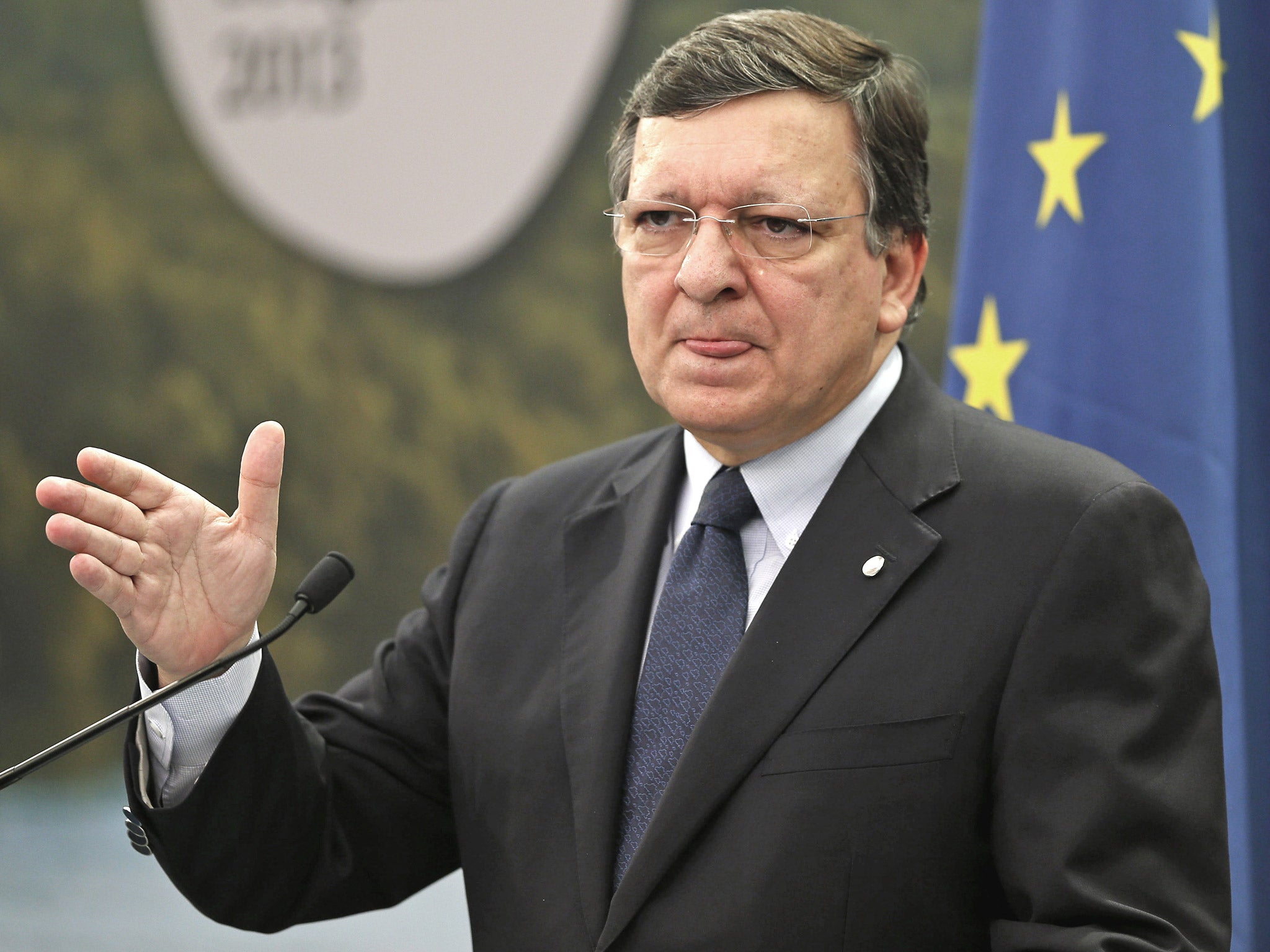Jose Manuel Barroso: End is in sight for eurozone crisis, but recovery threatened by 'political instability'
European Commission President appeals to member states to redouble efforts to quell financial turmoil

Your support helps us to tell the story
This election is still a dead heat, according to most polls. In a fight with such wafer-thin margins, we need reporters on the ground talking to the people Trump and Harris are courting. Your support allows us to keep sending journalists to the story.
The Independent is trusted by 27 million Americans from across the entire political spectrum every month. Unlike many other quality news outlets, we choose not to lock you out of our reporting and analysis with paywalls. But quality journalism must still be paid for.
Help us keep bring these critical stories to light. Your support makes all the difference.
European Commission President Jose Manuel Barroso declared on Wednesday that economic recovery was within sight after nearly four years of Europe's debt crisis and urged governments to move faster to complete a stalled banking union.
In his last State of the Union speech before European Parliament elections next May, Barroso offered no new policy proposals but appealed to member states to redouble efforts to quell financial turmoil that has led to a drawn-out recession and soaring unemployment.
“What we can and must do first and foremost is deliver the banking union. It is the first and most urgent way to complete our union,” he told lawmakers in Strasbourg.
His comments were an implicit challenge to Germany, the EU's leading power, which has worked to limit the scope of a single banking supervisor and slow the drive for a single bank resolution authority and fund, citing legal constraints and the wish to spare its taxpayers from liabilities for others' banks.
The goal of creating a single framework and backstop for around 8,000 European banks, with mechanisms to wind down failed lenders and protect savers' deposits, is one of the EU's most ambitious and challenging projects.
EU officials and many financial market economists say it is crucial to strengthen a banking system shaken by the crisis and open the way for lending again to spur growth. But efforts to implement it have stalled in the run-up to German elections on September 22, and there are doubts about whether Berlin will add impetus to the project even after a new government is in place.
“Make no mistake, there is no way back to business as usual,” Barroso said.
“Some people believe that after this everything will go back to the way it was before. They are wrong. We will not go back to the 'old' normal, we have to shape a 'new' normal.”
Barroso will finish his second five-year term as Commission president in November next year and is not expected to be re-appointed, so there was a strong dose of legacy in this address.
The centre-right former Portuguese premier launched a strong defence of Europe's crisis management ahead of pan-European elections that are expected to bring a surge in anti-EU votes, potentially shifting the balance of power in Brussels.
It was governments' fiscal mismanagement and financial market excesses - not EU policies - that had caused the crisis, he said, decrying a tendency for successes to be “nationalised” and failures “Europeanised”. Europe should not be cast as the enemy, he said.
He also urged leaders not to slacken in overhauling their economies and to introduce the structural reforms needed to put the euro zone and wider EU on a more stable footing.
“The recovery is within sight. This should push us to keep up our efforts,” Barroso said in an hour-long address that received lukewarm responses from political opponents. “We owe it to our 26 million unemployed.”
The biggest risk to a sustained recovery, he said, was political - a lack of commitment by leaders towards the goals agreed among them over the past three years.
In what might be perceived as another veiled criticism of Germany, Barroso said all 17 euro zone countries were in the same boat. While several - Greece, Portugal, Ireland and Cyprus among them - have required bailouts, that did not mean the rest had no work to do or couldn't help.
“When you are in the same boat, one cannot say: 'your end of the boat is sinking'. We were in the same boat when things went well and we are in it together when things are difficult,” he said.
“There is a direct link between one country's loans and another country's banks, between one country's investments and another country's business, between one country's workers and another country's companies.
”This kind of interdependence means only European solutions can work.“
The greatest concern for Barroso and other top policymakers is that the appetite for reform is waning as pressure from financial markets tapers off and a recovery begins.
A lot of the calm in markets over the past six months is due to the announcement last year by European Central Bank President Mario Draghi that he will do ”whatever it takes“ to protect the euro and ensure the monetary union holds together.
But the ECB's commitment has to be backed by reforms by the euro zone, whether adjustments to the pension system in France, lowering labour costs in Spain and Italy or spurring consumption in Germany.
Reuters
Subscribe to Independent Premium to bookmark this article
Want to bookmark your favourite articles and stories to read or reference later? Start your Independent Premium subscription today.
Join our commenting forum
Join thought-provoking conversations, follow other Independent readers and see their replies
Comments